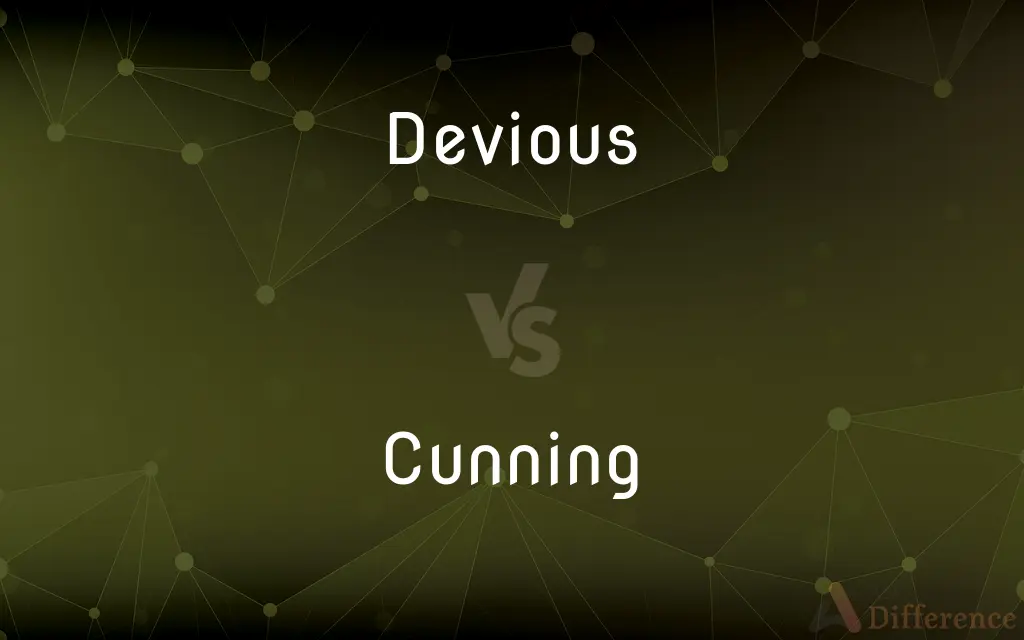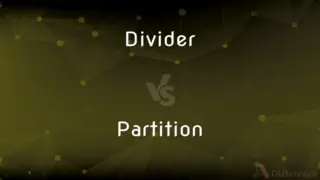Devious vs. Cunning — What's the Difference?
Edited by Tayyaba Rehman — By Maham Liaqat — Updated on April 4, 2024
Devious behavior is indirect and dishonest, aimed at achieving goals by deceit, while cunning involves cleverness and skill in deception or manipulation to achieve one's ends.

Difference Between Devious and Cunning
Table of Contents
ADVERTISEMENT
Key Differences
Deviousness implies a negative connotation, suggesting underhanded tactics and dishonesty to achieve one's goals, often through indirect or roundabout methods. Cunning, while also implying a form of deceit, suggests a higher level of ingenuity and cleverness, often admired for the skill involved despite its manipulative nature.
A devious person might use complex schemes or lies to mislead others, emphasizing the dishonest means used to reach an end. A cunning individual, on the other hand, employs sharp wit and intelligence to manipulate situations to their advantage, possibly without breaking trust or overt dishonesty.
Devious strategies often involve a betrayal of trust or ethical standards, suggesting a moral compromise in pursuit of an objective. Cunning strategies can be seen as strategically savvy or clever, using one's mental acuity to navigate or manipulate situations without necessarily resorting to unethical behavior.
While both devious and cunning behaviors involve some form of deceit, the admiration for cunning lies in the cleverness and originality of the approach, whereas deviousness is usually frowned upon for its lack of honesty and directness.
In literature and media, devious characters are often portrayed as villains with malicious intent, relying on complex schemes to achieve their goals. Cunning characters, while they may also employ deception, are often seen as more complex, possibly even heroic figures, using their wits to overcome obstacles or adversaries.
ADVERTISEMENT
Comparison Chart
Definition
Dishonest and indirect behavior aimed at achieving goals through deceit.
Cleverness and skill in deception or manipulation.
Connotation
Negative, suggesting underhanded tactics.
Neutral or slightly negative, admiring the skill involved.
Tactics
Involves complex schemes and lies.
Employs wit and intelligence.
Ethical Implication
Often involves betrayal of trust or ethical standards.
May manipulate situations cleverly without clear ethical breaches.
Perception
Generally frowned upon for dishonesty.
Admired for cleverness, despite manipulative nature.
Compare with Definitions
Devious
Engaging in or showing a cunning and deceitful way to achieve one's goals.
The politician's devious tactics to undermine his opponents were criticized by the public.
Cunning
Involves cleverness and originality.
His cunning solution to the puzzle impressed everyone in the room.
Devious
Seen negatively due to unethical behavior.
The devious manipulation of facts led to widespread misinformation.
Cunning
Exhibiting ingenuity and skill in deception.
The detective's cunning allowed her to outsmart the criminal at every turn.
Devious
Characterized by dishonesty and indirect methods.
She crafted a devious plan to bypass the rules without getting caught.
Cunning
May use manipulation cleverly without ethical breaches.
She used cunning negotiation tactics to secure a better deal.
Devious
Often involves betrayal or moral compromise.
His devious betrayal left the team in disarray, questioning their trust.
Cunning
Uses wit and intelligence to manipulate situations.
Through cunning diplomacy, the envoy averted an international crisis.
Devious
Lacks honesty and directness in achieving objectives.
The devious scheme involved misleading everyone about the project's real costs.
Cunning
Admired for mental acuity and strategic savvy.
The cunning strategist devised a plan that ensured victory with minimal resources.
Devious
Not straightforward; shifty
A devious character.
Cunning
Marked by or given to artful subtlety and deceptiveness.
Devious
Departing from the correct or accepted way; erring
Achieved success by devious means.
Cunning
Executed with or exhibiting ingenuity.
Devious
Deviating from the straight or direct course; roundabout
A devious route.
Cunning
Delicately pleasing; pretty or cute
A cunning pet.
Devious
Away from a main road or course; distant or removed.
Cunning
Skill in deception; guile.
Devious
Cunning or deceiving, not straightforward or honest, not frank.
Cunning
Skill or adeptness in execution or performance; dexterity.
Devious
Roundabout, circuitous, deviating from the direct or ordinary route.
Cunning
Sly; crafty; clever in surreptitious behaviour.
Devious
Out of a straight line; winding; varying from directness; as, a devious path or way.
Cunning
(obsolete) Skillful, artful.
Devious
Going out of the right or common course; going astray; erring; wandering; as, a devious step.
Cunning
(obsolete) Wrought with, or exhibiting, skill or ingenuity; ingenious.
Cunning work
Devious
Indirect in departing from the accepted or proper way; misleading;
Used devious means to achieve success
Gave oblique answers to direct questions
Oblique political maneuvers
Cunning
Cute, appealing.
Devious
Characterized by insincerity or deceit; evasive;
A devious character
Shifty eyes
Cunning
Practical knowledge or experience; aptitude in performance; skill, proficiency; dexterity.
Devious
Deviating from a straight course;
A scenic but devious route
A long and circuitous journey by train and boat
A roundabout route avoided rush-hour traffic
Cunning
Practical skill employed in a secret or crafty manner; craft; artifice; skillful deceit; art or magic.
Cunning
The disposition to employ one's skill in an artful manner; craftiness; guile; artifice; skill of being cunning, sly, conniving, or deceitful.
Cunning
The natural wit or instincts of an animal.
The cunning of the fox or hare
Cunning
(obsolete) Knowledge; learning; special knowledge (sometimes implying occult or magical knowledge).
Cunning
Knowing; skillful; dexterous.
"Tis beauty truly blent, whose red and whiteNature's own sweet and cunning hand laid on.
Esau was a cunning hunter.
Cunning
Wrought with, or exhibiting, skill or ingenuity; ingenious; curious; as, cunning work.
Over them Arachne high did lift
Cunning
Crafty; sly; artful; designing; deceitful.
They are resolved to be cunning; let others run the hazard of being sincere.
Cunning
Pretty or pleasing; as, a cunning little boy.
Cunning
Knowledge; art; skill; dexterity.
Let my right hand forget her cunning.
A carpenter's desertStands more in cunning than in power.
Cunning
The faculty or act of using stratagem to accomplish a purpose; fraudulent skill or dexterity; deceit; craft.
Discourage cunning in a child; cunning is the ape of wisdom.
We take cunning for a sinister or crooked wisdom.
Cunning
Shrewdness in deception;
As cunning as a fox
Cunning
Shrewdness as demonstrated by being skilled in deception
Cunning
Drafty artfulness (especially in deception)
Cunning
Attractive especially by means of smallness or prettiness or quaintness;
A cute kid with pigtails
A cute little apartment
Cunning kittens
A cunning baby
Cunning
Marked by skill in deception;
Cunning men often pass for wise
Deep political machinations
A foxy scheme
A slick evasive answer
Sly as a fox
Tricky Dik
A wily old attorney
Cunning
Showing inventiveness and skill;
A clever gadget
The cunning maneuvers leading to his success
An ingenious solution to the problem
Common Curiosities
Can a person be both devious and cunning?
Yes, a person can exhibit both deviousness and cunning, using complex schemes with cleverness and skill for manipulation.
Is devious behavior always intentional?
Devious behavior is typically intentional, as it involves deliberate dishonesty and indirect methods to achieve an objective.
How are devious characters typically portrayed in literature?
In literature, devious characters are often villains who rely on dishonest and complex schemes.
Can cunning be used for positive outcomes?
Yes, cunning can be used for positive outcomes, especially when it involves overcoming obstacles or adversaries with wit and intelligence.
What role does intent play in defining devious or cunning actions?
Intent plays a significant role, as devious actions are characterized by the intent to deceive, while cunning actions are driven by the intent to cleverly navigate or manipulate situations.
How do devious and cunning behaviors differ in terms of ethics?
Devious behavior often involves a betrayal of trust and ethical standards, while cunning can imply clever manipulation without clear ethical breaches.
How does society generally view cunning compared to deviousness?
Society may view cunning with a mix of admiration and caution for its cleverness, whereas deviousness is generally viewed negatively due to its association with dishonesty.
What does devious mean?
Devious refers to indirect and dishonest behavior aimed at achieving goals through deceit.
What characterizes cunning behavior?
Cunning behavior is characterized by cleverness and skill in deception or manipulation to achieve one's ends.
Why is cunning sometimes admired?
Cunning is sometimes admired for the ingenuity and originality involved, even when used for manipulation.
What makes a strategy devious?
A strategy is considered devious if it relies on dishonesty, indirect tactics, and often moral compromise to achieve a goal.
Is it possible to be cunning without being deceitful?
Yes, one can be cunning through cleverness and strategic thinking without necessarily engaging in deceitful behavior.
How does the perception of deviousness vary across cultures?
The perception of deviousness can vary, with some cultures viewing it more harshly than others, depending on values related to honesty and directness.
Can a devious plan be considered clever or ingenious?
While a devious plan might be clever in its construction, it is typically not admired due to its dishonest nature.
How do devious and cunning strategies impact relationships?
Devious strategies can damage trust and relationships due to their dishonest nature, while cunning strategies might strain relationships if perceived as manipulative, even if they're admired for their cleverness.
Share Your Discovery

Previous Comparison
Divider vs. Partition
Next Comparison
Box vs. ContainerAuthor Spotlight
Written by
Maham LiaqatEdited by
Tayyaba RehmanTayyaba Rehman is a distinguished writer, currently serving as a primary contributor to askdifference.com. As a researcher in semantics and etymology, Tayyaba's passion for the complexity of languages and their distinctions has found a perfect home on the platform. Tayyaba delves into the intricacies of language, distinguishing between commonly confused words and phrases, thereby providing clarity for readers worldwide.
















































